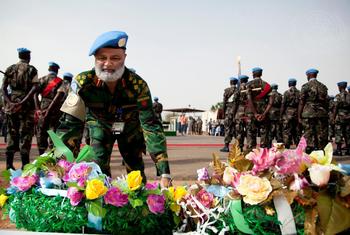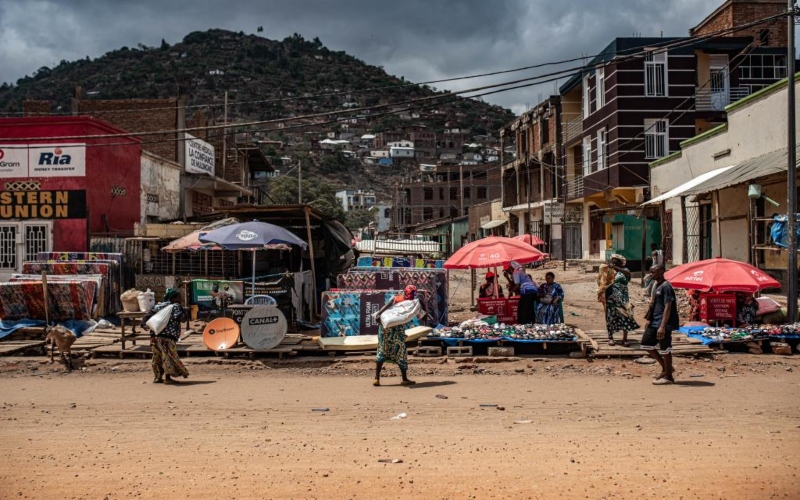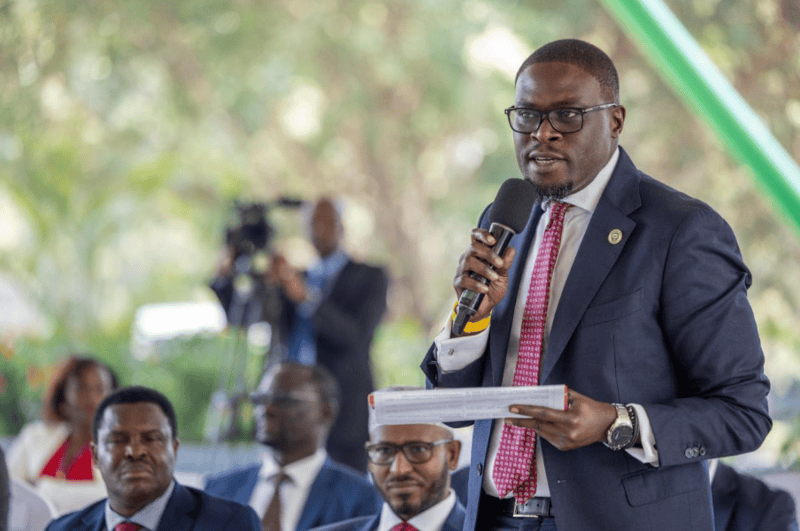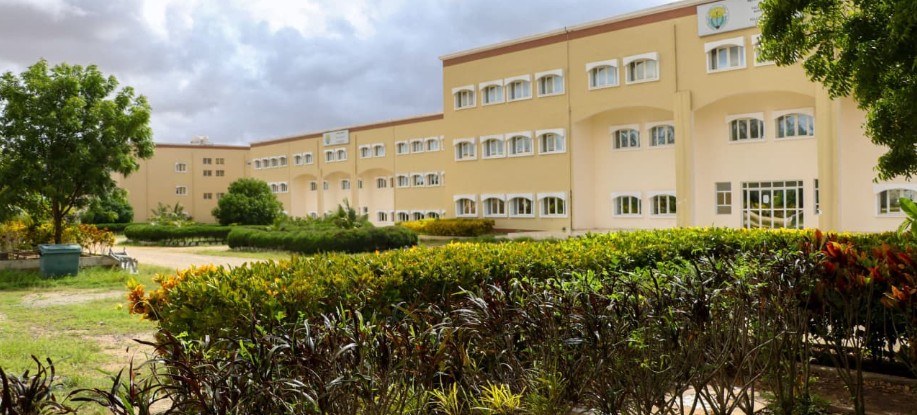Cyberspace tops agenda as Kenya hosts regional border security summit
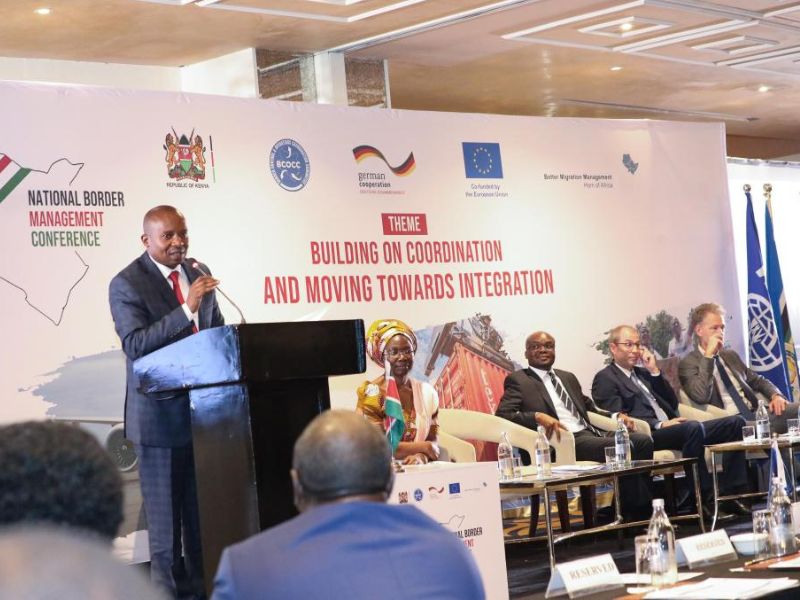
Cyberspace is the new frontier of focus in combating cross-border crimes, after land, sea, and air, Interior CS Kithure Kindiki says.
Cyberspace has become the fourth frontier of nations' border security after land, sea, and air, owing to increasing threats to national and transnational security, the Interior ministry has said.
Interior Cabinet Secretary Kithure Kindiki noted on Tuesday that the border security concept has changed in the sense that, while the physical border still exists, there's also the virtual border, which has become even more critical to manage and control.
More To Read
- Kenya’s security at risk as regional instability grows, warns NIS boss
- MPs blame security operation on Kitui-Tana River border for fuelling conflict
- Kenya strengthens cybersecurity through strategic US partnership
- State kicks off national crackdown to curb rising road carnage
- State launches revised border security plan in fight against organised crime
He spoke while launching the inaugural border management conference in Nairobi, which brings together countries that directly border Kenya. The conference seeks to address drivers of conflict and strengthen cooperation in trade and the safe movement of people.
"As we struggle to harness our efforts to control and manage the physical border, we are confronted with the virtual border, which is giving us even more complications," said Kindiki.
This will mean more concentration of security efforts on the virtual space in the foreseeable future.
"The traditional way of securing our country will remain relevant and therefore the traditional security hardware will remain crucial for countries in the immediate future," the CS said.
"In this regard, the Government of Kenya has recently equipped security forces with the latest equipment and resources to combat threats to national security, through the modernisation programme that includes the National Police Service (NPS), the National Intelligence Service (NIS) and the Kenya Defence Forces (KDF)."
NAIROBI, KENYA
— Kithure Kindiki (@KindikiKithure) April 2, 2024
TUESDAY, APRIL 2, 2024
Future border control and management will be driven by digital technology, data and artificial intelligence. While the traditional security hardware will remain crucial for Countries in the immediate future, the border of the future is… pic.twitter.com/BrhQdSt5vP
Beyond these efforts, the CS emphasised the need for vigilance and collaboration with citizens and neighbouring countries in intelligence-sharing to avert crime.
The three-day conference, themed "Building on Coordination and Moving Towards Integration," has brought together parties including representatives of the United Nations Office on Drugs and Crime (UNODC), the Intergovernmental Authority on Development (IGAD), and the European Union delegation to Kenya.
Others are diplomats and government officials from agencies that fall under the sector. These include; the Kenya Maritime Authority, the National Counter Terrorism Centre (NCTC), the Kenya Ports Authority, the Lamu Port-South Sudan-Ethiopia-Transport Project (LAPSSET), the Kenya Revenue Authority (KRA), and the Anti-Counterfeit Authority.
Others are the NPS, NIS, and Kenya Coast Guard Service, as well as representatives of Ethiopia, Somalia, Uganda, Tanzania, and South Sudan, all of which share 3,556 km of border space with Kenya.
Interior Permanent Secretary Raymond Omollo said the conference seeks to build a culture of collaboration and synergy to mitigate common challenges.
Omollo noted that locally, the adoption of a multi-agency approach at the points of entry and exit has seen the government improve its data collection and analysis, both of which have translated into effective operations.
"It is now easier to identify and respond to threats of a hybrid nature, including cross-border and transnational organised crimes. We are progressively reducing the use of forged travel documents, illegal migration, human trafficking, smuggling of weapons, trafficking or narcotics, and money laundering, among other crimes."
 Interior Permanent Secretary Raymond Omollo addresses the inaugural National Border Management Conference following its launch in Nairobi on April 2, 2024. (Photo: Interior ministry)
Interior Permanent Secretary Raymond Omollo addresses the inaugural National Border Management Conference following its launch in Nairobi on April 2, 2024. (Photo: Interior ministry)
Kenya's decision to abolish visa requirements for all foreign visitors on January 1, 2024, was criticised as an avenue that would allow criminals into the country.
To mitigate against that, the government implemented the Electronic Travel Authorization (eTA) that visitors must obtain before travel unless they are citizens of exempt countries.
"We must be able to strike a balance between facing trade and movement and making sure we do it securely," said Omollo.
Sharon Dimanche, the chief of mission of the Kenya office of the International Organisation of Migration (IOM), said they are committed to working with the country to ensure the illicit flow of goods and persons is mitigated with the removal of visa restrictions.
Last year, Kenya launched a coordinated border security and control curriculum to complement efforts to secure the country's borders and hosted the inaugural regional ministerial conference on migration.
"Kenya is a major mobility hub; we see very many people on the move through Kenya and others looking at it as a destination country. The fact that God blessed Kenya with its strategic location along the seaport means many countries benefit from you, so besides human mobility, we have goods transiting through the country," Dimanche said.
"This means that the security of Kenya has an impact on the security of the region and beyond."
Through the IGAD clusters, Ondrej Simek, the deputy ambassador of the EU delegation to Kenya, said the union is currently supporting the Horn of Africa, along the border of Kenya with South Sudan, the Moyale border, and the Mandera triangle (the common border between Kenya, Ethiopia, and Somalia).
They are addressing drivers of conflict and improving social cohesion in communities living in the area.
Germany's ambassador to Kenya, Sebastian Groth, said, "Where borders are managed effectively, trade flows, people move with ease and the cost of doing business is reduced. Border communities benefit and neighbouring countries benefit."
Top Stories Today

